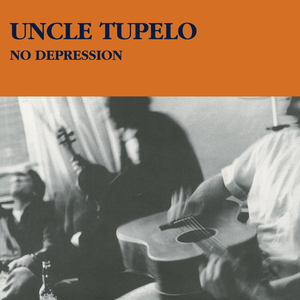Published on Jan 3, 2005
Contrary to popular belief,
No Depression didn’t give birth to the alt-country movement.
No more than did
Nevermind start the grunge movement. But the album, created
by three bushy-haired, beer-drinking kids raised on punk with a
deep appreciation of authentic country music, was good enough to
have a magazine named after it.
The term ‘alt country’ (or the more amusing ‘y’allternative’) is
about as vague as ‘alternative.’ Some define it was ‘roots’ music,
or country music without the synthesizers or gloss that defined
mainstream country music in the ’90s. Others define ‘alt-country’
as music that’s too country to get played on alternative radio and
too rough to be played on mainstream country music stations.
Fortunately,
No Depression is so good that neither definition comes into
play. The album just simply…rocks. The opening track,
“Graveyard Shift” has a chugging, pulverizing guitar riff that Jay
Farrar bounces around like a tennis ball against the side of a
garage. Farrar’s returns have been diminishing over the past few
years. And unfortunately, he never sounded as urgent and ragged as
he did on this album. Bassist Jeff Tweedy has had much better luck
sustaining his artistic relevance with Wilco, but after listening
to
A Ghost Is Born, it’s welcoming to hear him more concerned
with rocking out than making 12-minute arty statements of fuzzy
noise.
Farrar did the majority of the songwriting on
No Depression. Much of the album deals with
Nebraska-era Springsteen tales of small town desperation,
empty bottles and factory jobs. Tweedy takes songwriting credits
for the longing “That Year,” but his major coup comes with “Screen
Door.” The song focuses on a group of friends in a town where
escape seems impossible. At first, it sounds like a testament of
small town values, but the chorus “We don’t care what happens
outside the screen door” is hardly an endorsement for rural
isolation.
No Depression features two expert covers from their idols:
A.P. Carter’s “No Depression” and Leadbelly’s “John Hardy.” The
songs fit perfectly into the album, which is a testament of the
songwriting talents of Farrar and Tweedy. The rockabilly punch in
the middle of “John Hardy” is one of the most perfect marriages of
punk and country.
The band would get more ambitions on
Anodyne, which would also result in the ugly split between
Tweedy and Farrar. And while
Anodyne may arguably be the superior album, it doesn’t
contain near the joy and spontaneity of
No Depression. As chaotic as a night of whisky drinking and
as idealistic as a pipe dream,
No Depression is a landmark album with a very human
heart.
